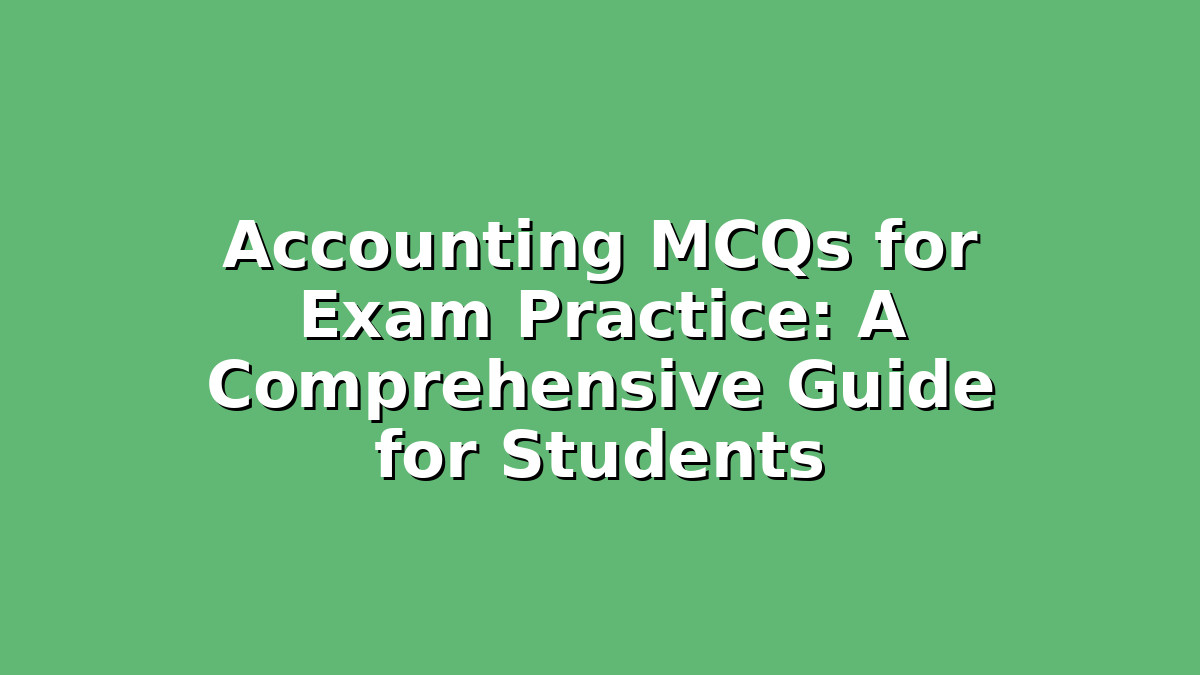Preparing for accounting exams can sometimes feel overwhelming, especially when it comes to mastering the wide range of concepts involved. Whether you’re a high school student tackling basic accounting principles or a college student diving into more complex topics like financial statements and managerial accounting, practice is key to success. One of the most effective ways to sharpen your understanding and boost your confidence is through Multiple Choice Questions (MCQs). Accounting MCQs not only help you test your knowledge but also train you to think critically under exam conditions.
In this blog post, we’ll explore how accounting MCQs can improve your exam preparation, share smart study techniques to maximize their benefits, and provide practical tips on how to approach these questions efficiently. By the end, you’ll feel more confident and ready to tackle your accounting exams with ease.
Why Practice Accounting MCQs?
Accounting is a subject that requires both conceptual clarity and application skills. Unlike subjects that rely solely on theory, accounting demands that you understand processes, calculations, and regulatory standards—all of which can be tested in various ways. MCQs are particularly valuable because:
– They cover a broad range of topics: MCQs can test your grasp on everything from fundamental accounting terms to complex journal entries and financial analysis.
– They help improve recall: Repeatedly engaging with questions forces your brain to retrieve information, strengthening memory retention.
– They develop exam strategy: Timing yourself on MCQs builds speed and accuracy, essential for efficient exam performance.
– They identify weak areas: By reviewing which questions you get wrong, you can pinpoint concepts needing further study.
Section 1: Using Accounting MCQs Effectively in Your Study Routine
To get the most out of practicing MCQs, it’s important to integrate them strategically into your study plan. Here’s how:
#### Start with Conceptual Understanding
Before jumping into MCQs, ensure you have a solid grasp of the theoretical foundations. Read your textbooks, watch tutorial videos, and review class notes to understand key concepts such as the accounting equation, ledger entries, depreciation methods, and financial statement components.
Once you feel comfortable with the material, begin practicing MCQs related to those topics. This approach reinforces your learning by immediately applying theory to questions.
#### Schedule Regular Practice Sessions
Make practicing MCQs a daily or weekly habit instead of cramming them all at once. Short, consistent practice sessions help maintain focus and prevent burnout. For example, dedicate 30 minutes each day to solving 10–15 MCQs, followed by reviewing explanations.
#### Use Varied Question Banks
Don’t limit yourself to a single source of MCQs. Explore questions from textbooks, online quizzes, and accounting exam prep apps. Different question sets expose you to diverse formats and difficulty levels, preparing you for any type of question your exam might present.
Section 2: Study Tips to Master Accounting MCQs
To excel at MCQs, it’s not enough to just answer questions—you must approach them with effective strategies:
#### Read Questions Carefully
Accounting questions often contain subtle wording that can change the meaning drastically. Take your time to fully understand what is being asked before looking at the answer choices. Watch out for keywords like “always,” “never,” “most appropriate,” or “except,” which can be critical to selecting the correct option.
#### Eliminate Wrong Answers
If you’re unsure of the correct answer, try to eliminate obviously incorrect choices first. Narrowing down options increases your chances of selecting the right answer, especially when guessing is necessary.
#### Practice Calculations and Journal Entries
Many accounting MCQs involve calculations or identifying the correct journal entry. Practice these regularly using sample problems so that you can perform them quickly and accurately during the exam.
#### Review Explanation for Every Question
Don’t just check whether you got a question right or wrong—read the explanations thoroughly. Understanding why an answer is correct or why another is wrong deepens your conceptual knowledge and prevents repeating mistakes.
#### Time Yourself
MCQ exams usually have strict time limits. Simulate exam conditions by timing your practice sessions. This helps you develop the ability to answer accurately without spending too much time on any one question.
Section 3: Additional Study Resources and Techniques
In addition to practicing MCQs, supplement your studies with other tools and methods to reinforce learning:
#### Flashcards for Key Terms and Formulas
Create flashcards for important accounting terms, definitions, and formulas. Flashcards help with quick recall and are easy to review anywhere, making them perfect for on-the-go study.
#### Group Study Sessions
Studying with peers can be highly beneficial. You can quiz each other with MCQs, discuss tricky concepts, and share different problem-solving approaches. Teaching someone else also strengthens your own understanding.
#### Use Online Accounting Simulators
Some websites and apps offer interactive simulations that mimic real-world accounting scenarios. These tools enable you to apply MCQ knowledge in practical contexts, enhancing your grasp of accounting processes.
#### Consult Your Instructor or Tutor
If you repeatedly struggle with certain types of MCQs, don’t hesitate to ask your teacher or tutor for clarification. They can provide targeted explanations and additional practice materials tailored to your needs.
Conclusion
Accounting MCQs are a powerful tool to help students prepare for exams efficiently and confidently. By incorporating regular MCQ practice into your study routine, applying smart answering techniques, and utilizing a variety of study resources, you can significantly improve your understanding and performance in accounting exams.
Remember, consistent practice and a positive mindset are your best allies. Don’t get discouraged by initial mistakes—they’re just steps on the path to mastery. Keep practicing, stay curious, and you’ll find yourself heading into your exams with the knowledge and confidence to succeed.
Good luck with your exam preparation!

Responses